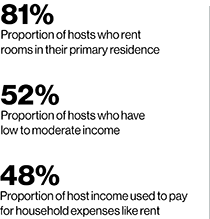The Homeowner as Hotelier
Greg Bugay and his wife, Lorraine, live in Fort Lauderdale, Florida, just a short distance from the Atlantic Ocean. They are empty nesters with more space than they need in their duplex. A decade ago, extra bedrooms in tourist havens often sat idle. No more. Today, digital connectivity has created a simple new line of work for 1.1 million people worldwide: renting out extra rooms for a few days at a time via Airbnb’s home-sharing site.
The Bugays have worked this new calling to perfection. They are among Airbnb’s most active hosts, renting so consistently that their spare bedrooms enjoy a remarkable 92 percent occupancy rate. They hardly need to do any marketing themselves; testimonials from more than 170 previous guests keep sending new visitors their way. All told, the Bugays calculate that they are booking about $90,000 a year in rental revenue.

Airbnb’s software is so efficient at organizing the rental calendar that Bugay figures it takes only about five hours a week for him and his wife to run their rental business. A few minutes of e-mail correspondence, a little socializing with guests over meals and card games, a round of laundry between visitors, and—voilà—everything is ready for the cycle to continue. If guests don’t speak much English, he says, “we use Google Translate to take care of breakfast requests or some advice about sights to see.”
San Francisco–based Airbnb is not the only company providing an online marketplace for hotel-style rentals in people’s homes. Other major players include VRBO, HomeAway, and FlipKey. But Airbnb, which began as an impromptu online listing by three housemates in 2008, has grown to be the category leader. It operates in 34,000 cities around the world and has rented to more than 40 million guests to date. This year private investors helped fund Airbnb’s further growth at a level that implied a valuation of $26 billion for the company. That’s more than long-established hotel chains such as Hilton and Marriott command in public stock markets.
Not everyone makes as much money on Airbnb as the Bugays: fewer than 5 percent of its lodging providers qualify as “super hosts.” Typical property owners in cities such as London or Sydney, Australia, earn slightly less than $5,000 a year, Airbnb calculates, by renting out a room or two intermittently. And the business is not without controversy. Violent clashes between hosts and guests periodically make headlines, though Airbnb says its vetting systems are designed to avoid this. City governments want Airbnb to collect hotel taxes, which the company generally is willing to do, while affordable-housing advocates sometimes argue that the rise of Airbnb hosting is making life harder for renters. A San Francisco referendum scheduled for November will test whether or not voters want to clamp down on Airbnb’s most active hosts.
When mass adoption of Internet connectivity took hold in the late 1990s, the travel industry was often cited as an area where the efficiencies afforded by new technology were squeezing out old jobs. Travel agents gave way to do-it-yourself online reservations; guidebooks lost their appeal in the face of competition from YouTube videos and TripAdvisor reviews. But as thrifty travelers make use of Airbnb and similar services, job cuts at hotels may be offset by opportunities in the new informal sector.
Airbnb may even be creating a new entrepreneurial ecosystem. For hosts who don’t want to be bothered with e-mailing confirmation details to their guests (or putting fresh linen on the bed), services such as Pillow, a startup trying to help owners manage their properties, have sprung up. These companies put more people to work, in maid service and clerical support, in return for 15 percent of booking revenue.
Keep Reading
Most Popular
Large language models can do jaw-dropping things. But nobody knows exactly why.
And that's a problem. Figuring it out is one of the biggest scientific puzzles of our time and a crucial step towards controlling more powerful future models.
The problem with plug-in hybrids? Their drivers.
Plug-in hybrids are often sold as a transition to EVs, but new data from Europe shows we’re still underestimating the emissions they produce.
Google DeepMind’s new generative model makes Super Mario–like games from scratch
Genie learns how to control games by watching hours and hours of video. It could help train next-gen robots too.
How scientists traced a mysterious covid case back to six toilets
When wastewater surveillance turns into a hunt for a single infected individual, the ethics get tricky.
Stay connected
Get the latest updates from
MIT Technology Review
Discover special offers, top stories, upcoming events, and more.